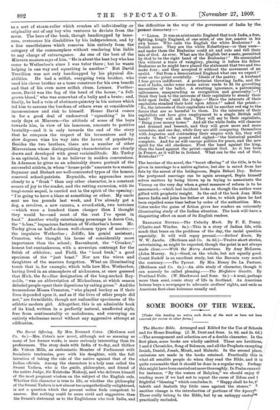The Burnt Offering. By Mrs. Everard Cotes. (Methuen and Co.
6s.)—Mrs. Cotes's new novel, although not so amusing as many of her former works, is more seriously interesting than its predecessors. The story deals with India of to-day, and thither Mr. Vulcan Mills, an enthusiastic Member of Parliament with Socialistic tendencies, goes with his daughter, with the full intention of taking the side of the native against that of the Indian officials. Among the characters is a holy man called the Swami Yadava, who is the guide, philosopher, and friend of the native Judge, Sir Kristodas Mnkerji, and who delivers himself of the most pregnant wisdom on the subject of the English. rule. Whether this character is true to life, or whether the philosophy of the Swami Yadava is not almost too sympathetically enlightened, is not a question which the present writer feels competent to answer. But nothing could be more vivid and seggestive than the Swami's statement as to the Englishmen who took India, and
'the' difficulties in the way of the government of India by the preIent democracy :- "' Listen. It was an aristocratic England that took India, a free, fighting, kingly England, of one mind, of one law, master in his own house. Who calls the English the white Brahmins ? A foolish name. They are the white Kshattriyas—or they were— and under them the Brahmins could sit and rule and tell their tale of God. As ever. What are the English but a caste, permitted by God to be the right band of the Brahmins ? ' He enunciated this without a trace of vainglory, placing it before his fellow Brahmins as he might have placed the statement that two and two make four ; and they accepted it without the movement of an eyelid. But from a democratised England what can we expect ?' went on the priest scornfully. Ideals of the pantry. A husband I fear grown indifferent. A proletariat throwing India, and the soul of India, under some mean axiom made to fit its grovelling necessities of the ballot. A strutting ignorance, a patronising callousness, masquerading as recognition and generosity.'—' I think they look to the interests of their capitalists to steady their hold upon India,' said the Judge.—' Have the interests of their capitalists steadied their hold upon Africa ? ' asked the priest.- ' No, the interests of their capitalists will be another red rag to the forces that are so harmful to them. Do the interests of their capitalists out here give employment to a single British mill hand ? They will ask that. They will say to their capitalists, " Bring your money home." And all the while India will clamour and demand and beseech, and they will grow more and more irresolute, and one day, while they are still comparing themselves with Augustus and contrasting their empire with his, they will awake to find'—he paused and sighed= the historical parallel complete. And for us will emerge politics for peace, and the new spirit for the old obedience. First the hand against the king, then the hand against the priest—against God. As it has been in France, as it will be in Ireland. What can be the end of that, Kristodas ? ' " The heroine of the novel, the "burnt offering" of the title, is to be given in marriage to a native agitator, but she is saved from her fate by the arrest of the bridegroom, Bepin Behari Dey. Before the postponed marriage can be again arranged, Bepin himself solves matters by being blown up in trying to assassinate the Viceroy on the very day when a great measure of reform is to be announced,—which last incident looks as though the author were gifted with prophetic insight. In the end of the book Joan Mills leaves India and joins her father at Aden, to which place he had been expelled some time before by order of the authorities. Mrs. Cotes under the guise of fiction gives her readers an extremely illuminating study of the Indian situation. The book will-have a disquieting effect on most of its English readers.
READABLE NovELs.—The Unlucky Mark. By F. E. Penny. (Chatto and Windus. 6s.)—This is a story of Indian life, with much that bears on the problems of the day, the racial question especially. It will well repay perusal.—Sailors' Knots. By W. W. Jacobs. (Methuen and Co. 3s. 6d.)—Twelve short stories, entertaining, as might be expected, though the point is not always made clear.—With the Merry Austrians. By Amy McLaren. (John Murray. 6s.)—Good, on the whole, but not equally good. Count Rudolf is an excellent study, but the Baronin very much the contrary.—The Tyrant. By Mrs. Henry De La Pasture. (Methuen and Co. 6s.)—An able study of character, though it can scarcely be called pleasing.—The Bluffshire Gazette. By Pentland Peile. (W. Blackwood and Sons. 6s.)—A semi, perhaps more than semi, comic story of life in Scotland. An American heiress buys a newspaper to advocate crofters' rights, and ends as American first-class heiresses usually end.














































 Previous page
Previous page